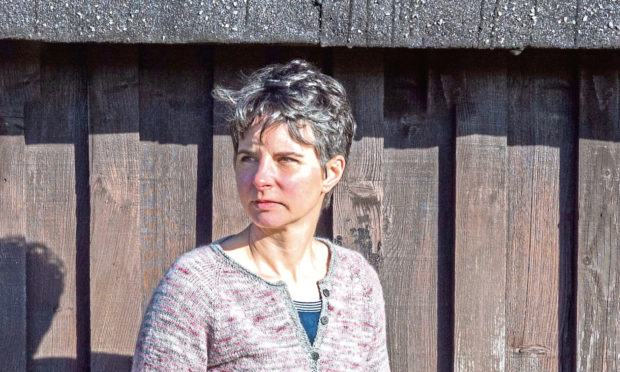Each week, we ask small businesses key questions. Here we speak to Julie Rutter, of Black Isle Yarns in Fortrose, on the Black Isle.
How and why did you start in business?
I grew up on a smallholding in East Lothian and, as well as spending as much time as I could helping with our own flock, I worked through teenage holidays in farm-related jobs – rogueing wild oats, milking and berry picking.
My love of the outdoors, the environment and land management led me into studying ecology and working in forestry.
But, as life often does, my path wandered off my imagined route when I met my husband, John, and once we had three children, working in forestry became more tricky – even more so after the fourth.
Once I stopped working, I quite quickly fell into sewing commissions and then designing quilts for Love Patchwork and Quilting Magazine.
I began knitting in every spare moment and loved the way certain wool yarns connected with specific places, and the potential to know the provenance and story of the material I was working with.
How did you get to where you are today?
Around the same time I began natural dyeing, collecting dye plants when out walking my dogs.
I wanted to use local and certainly British wool for dyeing, but there really wasn’t very much available. I took the leap to having a batch of yarn spun, and found that building a relationship with the farms and smallholdings I buy fleece from was especially rewarding.
Who helped you?
My dad ran his own very successful business and has been a huge help in keeping my financial planning and reconciliation up to date, when I’d much rather be selecting fleece or dyeing yarn.
John and the kids are very accommodating when it comes to my work.
Currently, the front door is blocked by 100kg (about 220.5lb) of new yarn, and no one has complained too much about having to climb over the bales to collect the post.
The Federation of Small Buisnesses’s insurance cover is excellent. It is really reassuring to have good product and public liability cover – a lot of my online sales are to the US and I regularly attend yarn shows.
It is good to know I have the FSB’s wealth of expertise and experience to call on should I need it.
What has been your biggest mistake?
Not forward planning as much as I could have done in the first couple of years.
What is your greatest achievement?
To date, the 100kg that is blocking the front door. It is a big step towards dropping my production costs and making the business more viable in the long term.
After 18 months of planning and support from the Highlands and Islands Enterprise Small Innovation Grant Scheme, I am really delighted with this special new larger-scale batch.
If you were in power in government, what would you change?
I’d reduce our reliance on synthetic fabrics and encourage a move back to clothing ourselves in more sustainable materials, such as wool.
What do you still hope to achieve?
As well as growing Black Isle Yarns, I would really like to help build awareness of the wonders of wool as a material. It is renewable, carbon sequestering, moisture absorbing, breathable and flame-retardant, and resistant to germs and dirt, so it needs far less washing.
Wool is such an amazing resource, which, sadly, is often underused and undervalued.
What do you do to relax?
Walking with the family and our two dogs, and running, which I much prefer to do on my own.
I love to be out in the woods and hills. And, of course, knitting, though the lines get a little blurred and I’m often knitting samples to show off my yarns.
What are you currently reading, listening to or glued to on the TV?
I tend to listen to the radio while I’m working, and I read anything and everything when time permits.
What do you waste your money on?
Other people’s yarn.
How would your friends describe you?
Organised, and giving the impression of being much calmer and more collected than I really am.
What would your enemies say about you?
Goodness knows.
What do you drive and dream of driving?
I drive a very battered eight-seater minibus and dream of a newer eight-seater minibus.
